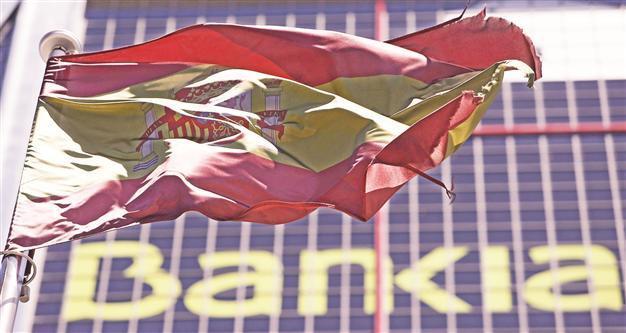Spain says crisis stricken banks need up to 62 billion euros to survive slump
MADRID - Agence France-Presse

A Spanish flag flutters in front of headquarters of Spain’s lender bank Bankia in Madrid June 21. Spain is expected to shed light on the dire state of its weaker banks and possibly make a formal request for EU funds. REUTERS photo
Spain announced June 21 that its crisis-torn banks need up to 62 billion euros ($78 billion) to survive a severe financial slump, far less than the maximum foreseen in a eurozone rescue deal.Prime Minister Mariano Rajoy, speaking in Brazil, welcomed the result of bank audits and stressed that the European funds were needed “as soon as possible.”
In Luxembourg, Eurogroup head Jean-Claude Juncker said Spain was expected to lodge a formal request for financial assistance for its banks by Monday.
European Commission, European Central Bank and International Monetary Fund officials would then negotiate loan conditions with Madrid, he said.
Spain released the results of two independent banking audits just days before it was due to formally request a loan from a credit line of up to 100 billion euros offered by the eurozone for Spanish banks hammered by a 2008 property market crash.
Two audits made for banks
The audits -- one by the German firm Roland Berger, the other from the US firm Oliver Wyman -- tested 14 top banking groups in a likely “baseline” scenario and a “stressed” outcome of a slumping economy and real estate sector. They found that in a stressed scenario lasting three years, the banks would need 51 billion-62 billion euros in extra capital. In a baseline case they would need just 16 billion-26 billion euros.
Rajoy said the results “reduce the capital needs to manageable margins and ensure that the financial assistance being made available to Spain by our European partners is more than enough.” “These results confirm that the actions taken so far by the government were necessary,” he said.
“I am wondering really whether markets are going to find these figures sufficiently credible,” said Edward Hugh, an independent economist based in Barcelona.
“Markets are going to wonder, especially if we are looking at a three-year term, whether this has gone far enough.” On the eve of the audit’s release, Fitch Ratings had said it estimated the Spanish banks’ capital needs at 50 billion-60 billion euros in a base case and 90 billion-100 billion euros in a scenario similar to the Irish crisis.
Fitch, however, said it did not actually expect Spanish banks’ credit losses to be as high as those in Ireland.
Bank of Spain deputy governor Fernando Restoy said the audits indicated that problems were limited to banks that were already being helped and that the rescue loan would be sufficient. “The agreed figure of 100 billion euros gives us ample margin,” he said. “The largest entities in the country do not need need additional capital,” he added.
The stressed scenario assumed a 6.5-percent slump in activity, a 26.4-percent dive in home prices and an 85-90-percent collapse in land prices over the three years, Restoy said.
But a look at the details showed some leeway was given.
Under the baseline scenario, for example, the jobless rate -- already at 24.4 percent in the first quarter of 2012 -- is assumed to be just 23.8 percent this year and 23.5 percent next year.
Even in the high stress scenario the jobless rate edges up only to 25.0 percent this year, and 26.8 percent in 2013.
Both scenarios expect the worst of the recession over within two years. In the base case, there is a recovery with the economy growing of 0.3 percent in 2014 and in the stressed scenario it contracts 0.3 percent in the same year.
















